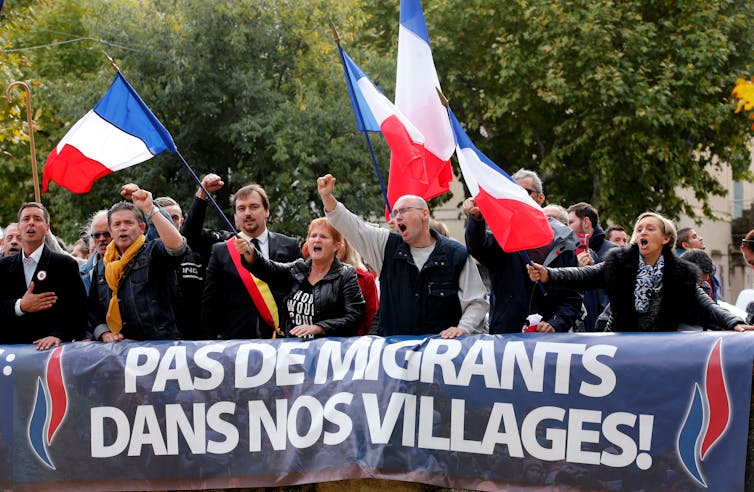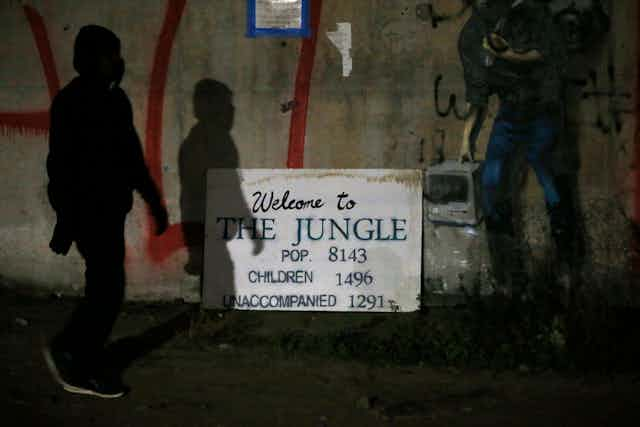Writer and social critic James Baldwin said that America did not so much have a “negro problem” but a “white problem”. In this vein, it seems that Europe is not so much experiencing a “migration crisis”, but a “European crisis”. The continent is failing those people seeking safety and a future in what they have been told is a land where human rights are respected.
The UN has said that 2016 is on track to become the deadliest year ever for migrants crossing the Mediterranean, as previous routes close and smugglers choose new, riskier passages across the sea to Europe.
Meanwhile in Calais, the “Jungle” migrant camp is being dismantled by French authorities. Its inhabitants, most of whom are desperate to reach the UK, are being transported to different locations around France.
Across Europe, migrants and refugees are increasingly faced with detention of dubious legality and temporal uncertainty in “hot spots” and reception centres, or in makeshift camps where they face routine police violence, while they try to prove their refugee status.
Failing European democracies
In Europe, would-be refugees do not benefit from the principle of presumed innocence until proven guilty. Instead, they are considered undesirables who must prove their worthiness as genuine, deserving refugees.
This can be seen in the attitudes expressed in certain British newspapers, where questions have been raised about the age of child refugees being relocated from Calais to the UK. British politician David Davies has even suggested dental checks to prove the age, and hence, the worthiness of these refugees.
Across the continent, not only do refugees have to display a well-founded fear of persecution in their home countries, but they also have to dispel fears that they pose a security threat in their new host countries. This is particularly the case for Muslims. Instead of being given an example of democracy in practice, too many migrants find that Europe is abandoning its own inspirational ethos.

Despite declarations and initiatives from the European Commission and its member states about the humanitarian imperative to save more lives at sea, quite the opposite is happening. By October of this year 3,649 people had died in the Mediterranean sea. These deaths cannot be simply read as unfortunate accidents nor should they simply be attributed to unscrupulous smugglers. They are also the consequence of European migration and border polices.
Sometimes this takes a direct form, as when European border guards use firearms to “fight the smugglers” but actually injure or kill refugees in the process of stopping the boats. News website The Intercept has reported on the shooting of boats as “standard rules of engagement for stopping boats at sea”.
At other times it takes less direct forms, for instance through so-called “push backs” – when border guards enforce collective expulsions of migrants and refugees from European areas of jurisdiction in order to evade asylum responsibilities.
The urgency of an ethical and legal response
This is what I mean when I say Europe is in crisis, as it grapples with a political climate characterised by the mainstreaming of authoritarianism, populist movements hostile to migrants and anti-Muslim racism. This political climate is all too often unchallenged by any alternative vision.

At best, we hear calls for a need to protect the most vulnerable, or the Christians, or to promote tolerance. But if we fall prey to such divisive reasoning, we will stop thinking in terms of rights and social justice.
Humanitarianism operates through notions of generosity and compassion, as it divides groups into hierarchies of deservedness in terms of perceived vulnerability. It lends itself to limited forms of protection – women and children first – and abrogates Europe of its legal obligations and the entitlement of all refugees to protection and dignified treatment.
Similarly, calls for “tolerance” are about as unsatisfactory as calls to only resettle Christian refugees. If we are striving for tolerance of a group of people, it is rather unlikely that we will think of them in positive terms, let alone as equals.
If we want to tackle the current crisis and restore the values Europe aspires to, we need to start thinking about migrants in terms of their rights rather than our generosity. We need think in terms of respect rather than tolerance.
Such a democratisation of the European border would require radically rethinking mobility as a human right, a proposition long called for by scholars. At its heart, this would require undermining the very existence of the classification of “migrant”.

